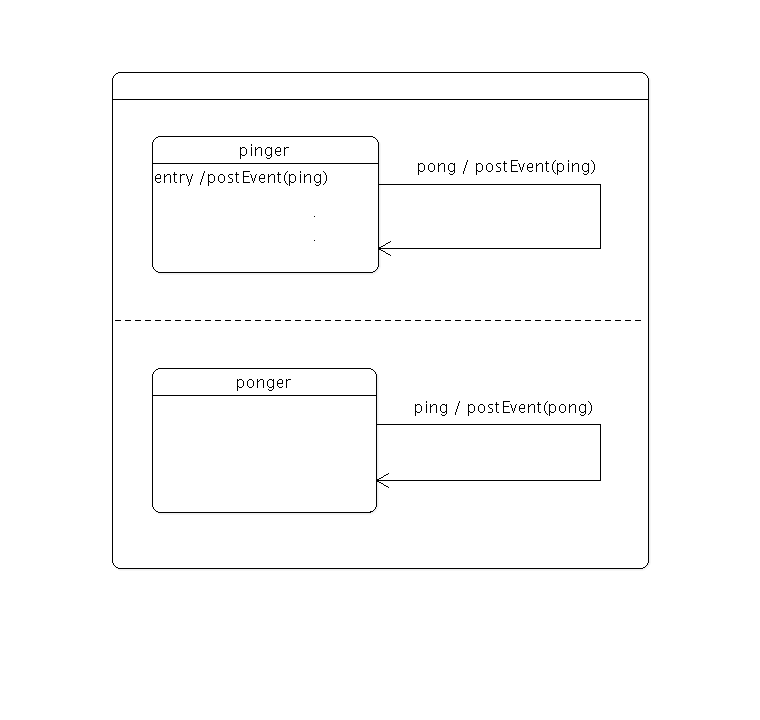Ping Pong States ExampleFiles: The Ping Pong States example shows how to use parallel states together with custom events and transitions in The State Machine Framework. This example implements a statechart where two states communicate by posting events to the state machine. The state chart looks as follows:
The pinger and ponger states are parallel states, i.e. they are entered simultaneously and will take transitions independently of eachother. The pinger state will post the first ping event upon entry; the ponger state will respond by posting a pong event; this will cause the pinger state to post a new ping event; and so on. class PingEvent : public QEvent { public: PingEvent() : QEvent(QEvent::Type(QEvent::User+2)) {} }; class PongEvent : public QEvent { public: PongEvent() : QEvent(QEvent::Type(QEvent::User+3)) {} }; Two custom events are defined, PingEvent and PongEvent. class Pinger : public QState { public: Pinger(QState *parent) : QState(parent) {} protected: virtual void onEntry(QEvent *) { machine()->postEvent(new PingEvent()); fprintf(stdout, "ping?\n"); } }; The Pinger class defines a state that posts a PingEvent to the state machine when the state is entered. class PingTransition : public QAbstractTransition { public: PingTransition() {} protected: virtual bool eventTest(QEvent *e) { return (e->type() == QEvent::User+2); } virtual void onTransition(QEvent *) { machine()->postDelayedEvent(new PongEvent(), 500); fprintf(stdout, "pong!\n"); } }; The PingTransition class defines a transition that is triggered by events of type PingEvent, and that posts a PongEvent (with a delay of 500 milliseconds) to the state machine when the transition is triggered. class PongTransition : public QAbstractTransition { public: PongTransition() {} protected: virtual bool eventTest(QEvent *e) { return (e->type() == QEvent::User+3); } virtual void onTransition(QEvent *) { machine()->postDelayedEvent(new PingEvent(), 500); fprintf(stdout, "ping?\n"); } }; The PongTransition class defines a transition that is triggered by events of type PongEvent, and that posts a PingEvent (with a delay of 500 milliseconds) to the state machine when the transition is triggered. int main(int argc, char **argv) { QCoreApplication app(argc, argv); QStateMachine machine; QState *group = new QState(QState::ParallelStates); group->setObjectName("group"); The main() function begins by creating a state machine and a parallel state group. Pinger *pinger = new Pinger(group); pinger->setObjectName("pinger"); pinger->addTransition(new PongTransition()); QState *ponger = new QState(group); ponger->setObjectName("ponger"); ponger->addTransition(new PingTransition()); Next, the pinger and ponger states are created, with the parallel state group as their parent state. Note that the transitions are targetless. When such a transition is triggered, the source state won't be exited and re-entered; only the transition's onTransition() function will be called, and the state machine's configuration will remain the same, which is precisely what we want in this case. machine.addState(group); machine.setInitialState(group); machine.start(); return app.exec(); } Finally, the group is added to the state machine, the machine is started, and the application event loop is entered. |
| Cette page est une traduction d'une page de la documentation de Qt, écrite par Nokia Corporation and/or its subsidiary(-ies). Les éventuels problèmes résultant d'une mauvaise traduction ne sont pas imputables à Nokia. | Qt 4.8 | |
| Copyright © 2012 Developpez LLC. Tous droits réservés Developpez LLC. Aucune reproduction, même partielle, ne peut être faite de ce site et de l'ensemble de son contenu : textes, documents et images sans l'autorisation expresse de Developpez LLC. Sinon, vous encourez selon la loi jusqu'à 3 ans de prison et jusqu'à 300 000 E de dommages et intérêts. Cette page est déposée à la SACD. | ||
| Vous avez déniché une erreur ? Un bug ? Une redirection cassée ? Ou tout autre problème, quel qu'il soit ? Ou bien vous désirez participer à ce projet de traduction ? N'hésitez pas à nous contacter ou par MP ! | ||
Copyright © 2000-2012 - www.developpez.com




















